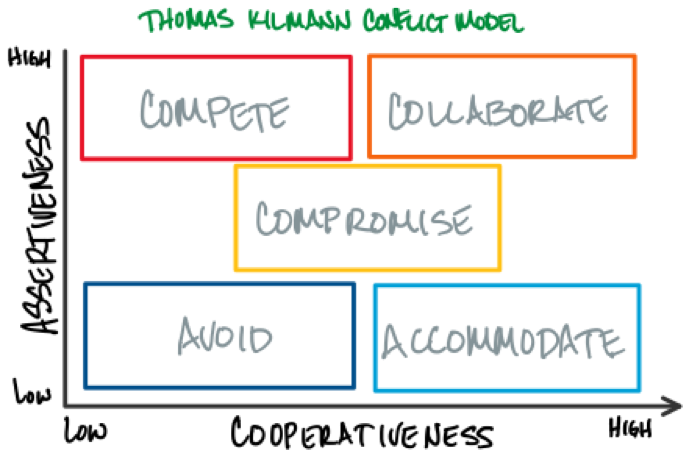The Confident Leader #5: Conflicted About Conflict

I was working with a CEO and his executive team when one of the leaders, Olivia, said, “I don’t like conflict. I avoid it like the plague.”
“Has that strategy been successful?” I pressed.
“Nope. I feel like conflict is around almost every corner.” Olivia confessed.
Olivia’s not alone. I hear this from almost every leader. If conflict comes with the job and avoidance is not effective, what is the right approach to address conflict?
>
“Avoidance is the best short-term strategy to escape conflict, and the best long-term strategy to ensure suffering.”
This Week’s Edition
As a leader, do you doubt your approach to conflict? Do you need a better way to think about and approach conflict?
Clarify Your Thinking
Olivia told me that every time she approached Mike, her employee, about his mistakes, Mike got defensive. “I’m hesitant to approach him because we always end up in a conflict.” Olivia said.
“What do you need from him?” I asked Olivia.
“I need him to own his mistakes, and not take it so personally.”
“What’s your typical approach? Do you handle the situation directly?” I asked.
“Well, not really. I walk on egg shells hoping he’ll get the message.” She shared.
“How’s that working for you?” I asked.
“Not so well. I end up either doing his job for him or avoiding the situation altogether.”
We are confident and capable leaders in so many areas. Yet, when it comes to conflict, we often soft pedal or back off entirely, resulting in inefficiencies and leadership frustration.
If a leader enters a conversation thinking it is going to be a conflict, guess what they will find? Conflict! Leaders typically think their options are either conflict or avoidance. This narrow binary view creates leadership doubt.
Leaders have options when it comes to conflict. Notably, confrontation and conflict are two different things. If you confront an issue, it is possible it can be resolved thus heading off conflict. However, if you do not confront an issue you are almost certainly assured of a future conflict.
This simple concept changed Olivia’s thinking immediately. Mentally bracing for conflict with Mike was a thing of the past. Olivia’s approach was more objective in addressing Mike’s mistakes. This less personal approach opened a dialogue that trained Mike on the corrections needed. To change your thinking about conflict, download the Clarify Your Thinking Worksheet.
Armed with a new way to think about conflict, Olivia was motivated to learn how to confront issues early to determine which ones could be resolved before devolving into conflict.
No one wants to live in the land of conflict. Yet, when we fail to confront issues, we often find ourselves smack dab in the middle of conflict, the exact thing we did not want from the get go.
When thinking about confronting an issue, leaders need to recognize they often do not have all the information. As a result, leaders look to fill in the gaps. They tell themselves a story they believe makes logical sense. “Mike always does this. Here he goes again.” Unfortunately, that assumptive “story” contributes to the resulting conflict.
Change your approach. Seek to understand the situation you need to confront. Solicit information by initiating dialogue:
· Tell me about this situation from your perspective.
· What were you trying to accomplish?
· Tell me how you went about it?
· Did you get the result you intended?
· What, if anything, do you want to do differently?
This opens the door to more information and a spirit of collaboration to addressing the situation. Confronting issues is hard and it takes time. But, conflict is harder and more time consuming. Commit to honing your skills at confronting issues and watch your confidence grow.
Complete the coaching assignment to learn the skills you need to confront issues directly.
Boost Your Performance
By confronting issues head on, you will cultivate stronger relationships with your team members, which will improve your leadership and the effectiveness of your team. It will boost your leadership performance.
What’s Your Opinion?
Email me your best practice for confronting situations that head off conflict. robin.pou@robinpou.com
Don’t let Doubt count you out. Do your leadership part and commit to a hearty restart. Have a confident week!
Robin Pou, Chief Advisor and Strategist
If this was helpful, feel free to share it with another leader who needs to defeat doubt and complete their confidence.
Let’s Connect
Follow me on Linkedin, Facebook and Twitter.
What is “The Confident Leader”?
During the Covid-19 Pandemic, I began a video series called “Panic or Plan?” It was designed to equip leaders to navigate the doubt they experienced and to rise in the confidence they needed to lead during turbulent times. It took off. I then started this newsletter to equip leaders in the same fashion each week for the doubt that crashes across the bow of their leaderSHIP.
welcome to the club! I see you.
- Step out of Doubt
- Complete your Confidence
- Tackle any leadership challenge




